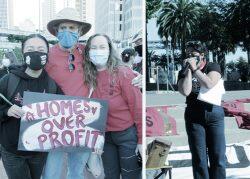A rent strike that started with two Veritas-run San Francisco apartment buildings is likely to expand to others starting July 1 in a bid to influence the sale of $1 billion in debt on 95 Veritas-run multifamily buildings.
The strategy carries risk and tenants did not undertake it lightly, said Housing Rights Committee lead organizer Brad Hirn. But state law provides a “legal shield” because nonpayment of rent is allowed when there are notices of violations on a building that are more than 35 days old.
“This strike is motivated by urgent issues going on in the buildings, and also an eye towards the building maybe changing hands,” he said. “We need to have a seat at the table in terms of who the next landlords might be.”
The Real Deal earlier reported that Veritas plans to bid on its own debt for the 95 buildings. Eastdil Secured, the brokerage conducting the debt auction, took bids until June 6, but it could be weeks until a winner is announced.
The debt is divided into two portfolios — one with 75 buildings and $800 million in loans and the other with 20 buildings and nearly $140 million in debt — with a total of 2,452 units, which represents about a third of Veritas’ apartment total in the city.
A purchase by the city or a nonprofit group would be ideal, Hirn said, “if that’s what the tenants want.”
He said that he was not aware of any bids on the debt by the city, but that San Francisco has brought in millions of dollars through Measure I, a 2020 ballot measure that increased the city’s property transfer tax rate to support affordable housing production. He acknowledged that a purchase of this size was unlikely given the city’s “temporary pause on acquisitions of new properties because of the budget.”
‘Political demands’
Even if the new owner is likely to be another institution-backed investor, or Veritas itself, Hirn said the spreading strike will still give tenants a say.
“I think the VTA [Veritas Tenants Association] is trying to say to potential buyers, ‘Look, if you are looking at this portfolio or looking at our buildings to try and buy, know that these are our demands, know that this is what we would want to be able to have a say in, and this is what we’re willing to do to assert that voice,’” he said.
Hirn said he informed Veritas about the strike just after it started on June 1. A Veritas representative confirmed the company received his letter “days after it was already announced in the news,” and that it “outlines a set of political demands which go far beyond addressing issues of physical concerns at the buildings.” They include “negotiating terms of sale to set the building on a path towards removal from the private rental market.”
The representative added that none of the notices of violation, which are issued by the Department of Building Inspection, relate to conditions that create immediate life and safety issues for residents and said that, in general, NOVs are “difficult to remove given the DBI’s work load and limited resources.”
Also, the state law Hirn referenced, Civil Code 1942.4, requires a delay past 35 days to be “without good cause” to legally withhold rent and the company said in both buildings there are valid reasons for the long repair time, such as an old elevator in one building that required a “small business vendor who specializes in period equipment that often requires the custom manufacture of brand new parts” and in the other a seismic upgrade complicated by the difficulty in completing a shear wall that abuts a neighboring gas station.
“Veritas acts diligently on property improvements and repairs, and works through circumstances that can cause delays, always informing residents along the way,” the company stated.
Labor-inspired legislation
This latest action comes after a debt strike on Veritas properties that Hirn helped organize in 2021, in an effort to force the hand of the city’s biggest landlord to forgive some pandemic-related back rent not covered by federal relief funds. It is part of a larger effort by the tenant rights activist to organize renters beyond individual litigation, which Hirn said does not create long-lasting change.
“People always think there are so many pro-tenant things in San Francisco, but in reality the organized opposition from the real estate industry is also extremely strong,” he said. “So there’s a need for, I think, greater organization of tenants themselves and not just relying on the familiar tool of litigation.”
To that end, Hirn said HRC had been working for years to “build up a citywide union of tenants living in these buildings and to actually have a seat at the table to negotiate the decisions that are impacting their homes.”
San Francisco’s first-of-its-kind ordinance, passed in April, requires owners to sit down with tenant associations on a quarterly basis to hear their concerns. Whether it also grants those tenants bargaining power similar to a labor union is “currently in dispute,” Hirn said.
“The intent of the ordinance by the Board of Supervisors was to extend collective bargaining,” he said, adding that amendments to clarify that intent will be forthcoming from the board. “The language around ‘meet and confer’ was inspired by labor law. So the quarterly meeting is just a floor, it’s not meant to be a ceiling.”
The San Francisco Apartment Association said that it has not heard of any amendments to the ordinance coming before the board, and that though clarifications to the ordinance are currently happening at the Rent Board, none of them would allow collective bargaining.
“I think legally they’re on a slippery slope on that one,” said SFAA Executive Director Janan New. “I don’t think they have the ability, legally, to collectively bargain.”
Landlord and tenant advocates also differ on how much the new association legislation is utilized by the tenant community. Hirn says 35 of the roughly 280 Veritas buildings have come onboard since April, and that tenants “want to be able to bargain over rent and pass throughs,” among other issues.
Veritas puts the number at 16, with another seven that were formed but have become inactive because they have not maintained a majority of residents signed up in the building. Most associations have not yet requested a meeting, the company added.
SFAA’s Charley Goss said that usually, when new landlord-tenant legislation passes, “many tenants will avail themselves of that legislation, and what we’ve seen with this program is that the only building associations that have been formed have been from a concerted effort from an outside group.”
Hirn said he continues to see promise in tenant organization in a city where, even with the pandemic-era drop in rents, working-class tenants continue to be outpriced. Collective actions like the rent strike give residents greater say in a process that usually unfolds “behind closed doors,” he said, though he admits he still has limited insight into the ongoing negotiations on the debt sale, which collected offers on June 6.
“Every day I wake up and I’m like, is it going to be a headline that Veritas has scooped up its own portfolio again or is it going to be another one?” he said. “We’ll see.”
Read more



